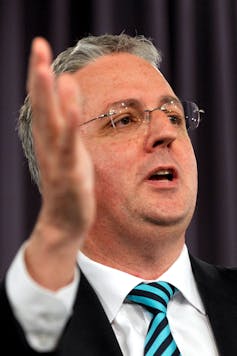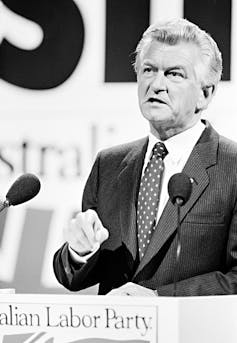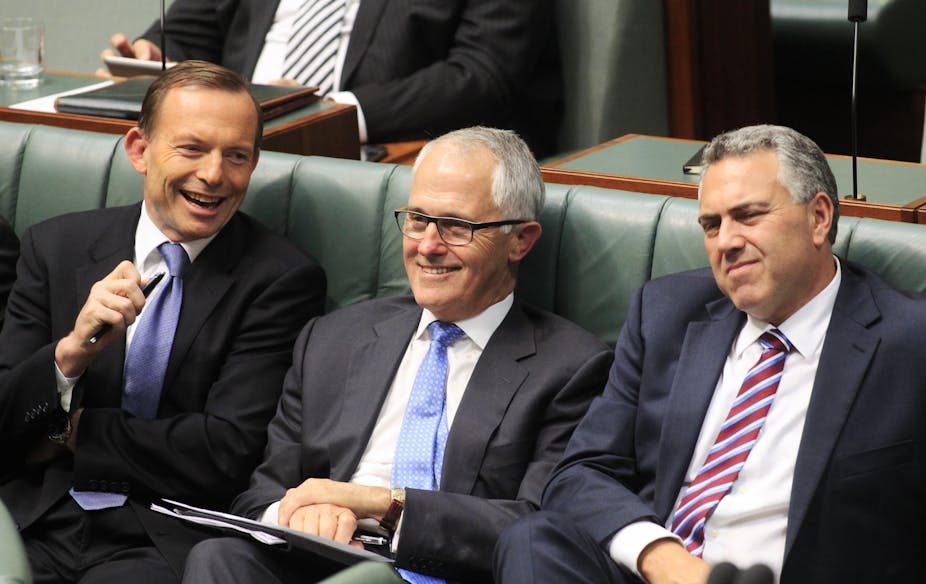Due to Australia’s small population and high concentration of few media voices, public broadcasters play a pivotal role in shaping the media ecosystem and cultural landscape. With the ABC and SBS under scrutiny ahead of the budget, The Future of Public Broadcasting series looks at the role of these taxpayer-funded broadcasters, how they shape our media and whether they provide value for money.
On successive days in January this year, federal politicians began softening up the ABC for the likelihood of funding cuts in the May budget. On January 29, the prime minister, Tony Abbott, attacked the ABC for its coverage of the asylum-seeker issue and for broadcasting intelligence material leaked by Edward Snowden. Abbott said:
I want the ABC to be a straight, news-gathering and news-reporting organisation and a lot of people feel at the moment that the ABC instinctively takes everyone’s side but Australia’s.
The next day, the communications minister, Malcolm Turnbull, announced an “efficiency review” of the ABC and fellow public broadcaster SBS.
Even by the robust standards of conflict between successive governments and the ABC, the timing and the sentiments were pretty crude. Urging the media to favour a particular “truth” is the stuff of tyranny. Turnbull, the lawyer who defended retired MI5 agent Peter Wright in the Spycatcher case, was not buying into that line of argument, but the timing was stark all the same.
And not just the timing. What was the purpose of the review, beyond waving a big stick? The government’s own Commission of Audit was already on the case of finding areas for budget cuts and savings.
Timeline of the ‘softening up’
It had the look of a softening-up process. That certainly seemed to be the view of the ABC’s managing director, Mark Scott. In February, he took the opportunity of an appearance before a Senate estimates committee to try to hold Abbott to his election promise that the ABC would be spared the budgetary knife. Scott did so again at a public lecture at the University of Melbourne on April 1.

Scott is a doughty advocate, but his experience in public life must have taught him that a politician’s promise is usually not worth the spittle needed for its delivery. It would be surprising if the calculators were not already running hot at the ABC’s headquarters in Ultimo as executives looked for ways of doing more with less.
Within a fortnight of that lecture, Fairfax Media reported that Abbott was poised to break his election promise; that the cabinet’s expenditure review committee was looking at ways to cut and how deeply; and that one option was to introduce an efficiency dividend, from which ABC and SBS are currently exempt. This would cost the ABC A$22.5 million in the first year.
The media becomes a player
Speaking of softening up, the Fairfax story was a great example of how the media inevitably plays a part in the process. It seems obvious that Fairfax scored a leak. Its story was written in an authoritative voice, yet no source for the key information was identified.
The usual formalities were observed: the reporters put the question to the prime minister’s department, which duly referred them to the relevant minister (Turnbull), who, in conformity with propriety, declined to comment on matters in the budget. But the story ran, the Fairfax papers got the scoop and the government remained contentedly silent as an atmosphere of inevitability developed about the cuts.
Why leak it to Fairfax? Probably because the story’s appearance there would give it a keener edge of credibility than might have been the case had it appeared in The Australian. With that paper’s long history of antagonism to the ABC, it might have been seen by the public as wish fulfilment. If you are going to create a sense of inevitability, you don’t want it blunted by uncertainty.
In the event, The Australian played the story straight, following up with interviews with two former ABC chairs. Both said the ABC would have to take its lumps like the rest of us.
Subsequent remarks by Turnbull and the treasurer, Joe Hockey, played into this sense of burden-sharing. There are echoes here of the BBC’s experience in the UK where the Cameron government cut its budget by 16% in 2010.
Attacks on the ABC aren’t new
Government displeasure with the ABC and budgetary pain for the national broadcaster are almost clichés of Australian politics. Ken Inglis’ history, Whose ABC?, is replete with them.

Labor prime minister Bob Hawke was furious at an ABC report that he had agreed to Australia’s helping the US test nuclear missiles in defiance of Labor policy. He lambasted the ABC’s analysis of the first Gulf War in 1991 as “loaded, biased and disgraceful”; he was infuriated with a Four Corners investigation into the business dealings of his friend Sir Peter Abeles, transport magnate and one-time joint managing director of Ansett Airlines (with Rupert Murdoch).
The ABC calculated that over the decade 1985-86 to 1995-96, during which the Hawke-Keating governments were in office, funding fell in real terms by 25%.
When John Howard came to power in 1996, his treasurer, Peter Costello, was able to use what he called Labor’s “$8 billion black hole” as part of his own softening-up process for large budget cuts in which the ABC was not spared.
This was only the start of a long period of antagonism between the Coalition government and the ABC, which included vociferous criticism of the ABC over its coverage of the 1998 waterfront dispute, the “children overboard” asylum-seeker scandal in 2001 and the Iraq War in 2003.
So, the current drama – serious as it is – draws on a well-rehearsed script, the key ingredients of which are political antagonism to ABC journalism and a budgetary emergency, real or confected, that provides cover for a bit of fiscal payback.
Read more articles in The Future of Public Broadcasting.

